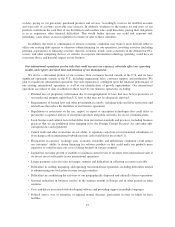Symantec 2012 Annual Report Download - page 98
Download and view the complete annual report
Please find page 98 of the 2012 Symantec annual report below. You can navigate through the pages in the report by either clicking on the pages listed below, or by using the keyword search tool below to find specific information within the annual report.or delay paying us, for previously purchased products and services. Accordingly, reserves for doubtful accounts
and write-offs of accounts receivable may increase. In addition, weakness in the market for end users of our
products could harm the cash flow of our distributors and resellers who could then delay paying their obligations
to us or experience other financial difficulties. This would further increase our credit risk exposure and,
potentially, cause delays in our recognition of revenue on sales to these customers.
In addition, the onset or continuation of adverse economic conditions may make it more difficult either to
utilize our existing debt capacity or otherwise obtain financing for our operations, investing activities (including
potential acquisitions) or financing activities. Specific economic trends, such as declines in the demand for PCs,
servers, and other computing devices, or softness in corporate information technology spending, could have an
even more direct, and harmful, impact on our business.
Our international operations involve risks that could increase our expenses, adversely affect our operating
results, and require increased time and attention of our management.
We derive a substantial portion of our revenues from customers located outside of the U.S. and we have
significant operations outside of the U.S., including engineering, sales, customer support, and production. We
plan to expand our international operations, but such expansion is contingent upon the financial performance of
our existing international operations as well as our identification of growth opportunities. Our international
operations are subject to risks in addition to those faced by our domestic operations, including:
• Potential loss of proprietary information due to misappropriation or laws that may be less protective of
our intellectual property rights than U.S. laws or that may not be adequately enforced
• Requirements of foreign laws and other governmental controls, including trade and labor restrictions and
related laws that reduce the flexibility of our business operations
• Regulations or restrictions on the use, import, or export of encryption technologies that could delay or
prevent the acceptance and use of encryption products and public networks for secure communications
• Local business and cultural factors that differ from our normal standards and practices, including business
practices that we are prohibited from engaging in by the Foreign Corrupt Practices Act and other anti-
corruption laws and regulations
• Central bank and other restrictions on our ability to repatriate cash from our international subsidiaries or
to exchange cash in international subsidiaries into cash available for use in the U.S.
• Fluctuations in currency exchange rates, economic instability and inflationary conditions could reduce
our customers’ ability to obtain financing for software products or that could make our products more
expensive or could increase our costs of doing business in certain countries
• Limitations on future growth or inability to maintain current levels of revenues from international sales if
we do not invest sufficiently in our international operations
• Longer payment cycles for sales in foreign countries and difficulties in collecting accounts receivable
• Difficulties in staffing, managing, and operating our international operations, including difficulties related
to administering our stock plans in some foreign countries
• Difficulties in coordinating the activities of our geographically dispersed and culturally diverse operations
• Seasonal reductions in business activity in the summer months in Europe and in other periods in other
countries
• Costs and delays associated with developing software and providing support in multiple languages
• Political unrest, war, or terrorism, or regional natural disasters, particularly in areas in which we have
facilities
19
























